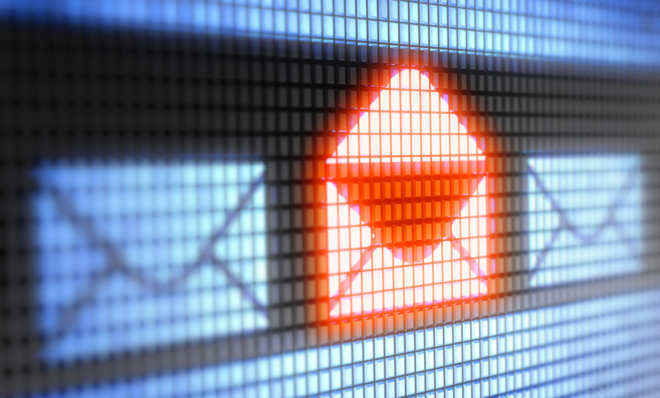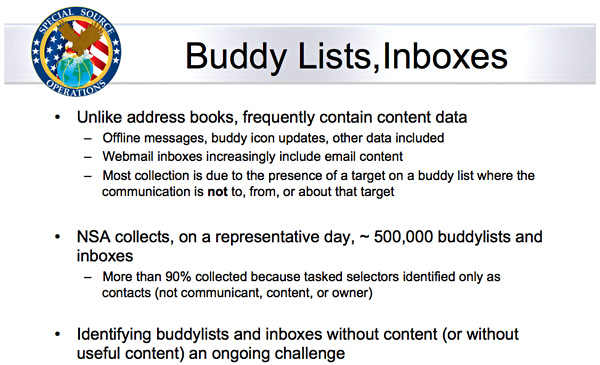The NSA might have collected your email contacts
A new report claims that the NSA collects millions of email and IM contacts every year

A free daily email with the biggest news stories of the day – and the best features from TheWeek.com
You are now subscribed
Your newsletter sign-up was successful
Edward Snowden might be safe in Russia, receiving awards from ex-U.S. intelligence officials, but the information he leaked as a contractor for the National Security Agency is still causing a stir.
The latest report? The NSA is collecting email address books and IM contact lists from both U.S. and foreign accounts, according to a document leaked to The Washington Post. This is not a small-scale operation. Up to 250 million contact lists are scooped up by the NSA every year, according to the Post, which adds up to "a sizable fraction of the world's e-mail and instant messaging accounts."
During a single day last year, the Post reports, the NSA collected the following number of email address books:
The Week
Escape your echo chamber. Get the facts behind the news, plus analysis from multiple perspectives.

Sign up for The Week's Free Newsletters
From our morning news briefing to a weekly Good News Newsletter, get the best of The Week delivered directly to your inbox.
From our morning news briefing to a weekly Good News Newsletter, get the best of The Week delivered directly to your inbox.
The email sweeps take place overseas, intelligence officials told the Post, but the NSA does collect the contacts of many Americans — possibly millions or even tens of millions of them.
The U.S. intelligence community denies it's collecting information on innocent Americans, claiming to the Post through a spokesperson that it's focused on "valid foreign intelligence targets like terrorists, human traffickers, and drug smugglers" and not on "personal information about ordinary Americans."
Still, this latest leak could hit home for a lot of Americans, mostly because the information gathered is less abstract than, say, bulk phone call metadata. Email address books can include a lot of personal information: Names and email addresses, and sometimes even street addresses, telephone numbers, and the first few lines of an email message.
For the average person, "the NSA can read your buddy list" is a much more alarming story than "the NSA has access to a global metadata search engine." This particular leaked slide might cause people to rethink chatting online. Here, a helpful chart from The Washington Post:
A free daily email with the biggest news stories of the day – and the best features from TheWeek.com

(That's right: The NSA can apparently read your clever chat updates).
Today, despite President Barack Obama promising major steps towards transparency more than two months ago, the NSA more or less remains opaque.
Much of the political heat surrounding the NSA dissipated when Congress became distracted by Syria and then the government shutdown. But the shutdown drama won't last forever. When the government is running and the debt ceiling is raised, the media and members of Congress could turn their attention back to the NSA — and there might be plenty of controversial leaks waiting for them.
"There are a lot more stories," The Guardian's Glenn Greenwald said in Rio de Janeiro on Monday. "The archives are so complex and so deep and so shocking, that I think the most shocking and significant stories are the ones we are still working on, and have yet to publish."
Greenwald, speaking at an investigative journalism conference, said he was in daily contact with both Edward Snowden and U.S. filmmaker Laura Poitras, and that he was still digging through "thousands and thousands of documents."
Previously, that might have seen as bluster. But this recent leak is a sign that the White House might have plenty more questions to answer about how the NSA collects data and what it uses it for.
Keith Wagstaff is a staff writer at TheWeek.com covering politics and current events. He has previously written for such publications as TIME, Details, VICE, and the Village Voice.
-
 Film reviews: ‘Send Help’ and ‘Private Life’
Film reviews: ‘Send Help’ and ‘Private Life’Feature An office doormat is stranded alone with her awful boss and a frazzled therapist turns amateur murder investigator
-
 Movies to watch in February
Movies to watch in Februarythe week recommends Time travelers, multiverse hoppers and an Iraqi parable highlight this month’s offerings during the depths of winter
-
 ICE’s facial scanning is the tip of the surveillance iceberg
ICE’s facial scanning is the tip of the surveillance icebergIN THE SPOTLIGHT Federal troops are increasingly turning to high-tech tracking tools that push the boundaries of personal privacy